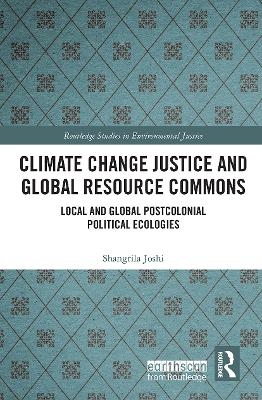
Climate Change Justice and Global Resource Commons
Local and Global Postcolonial Political Ecologies
Seiten
2021
Routledge (Verlag)
978-0-367-36455-7 (ISBN)
Routledge (Verlag)
978-0-367-36455-7 (ISBN)
This book examines the multiple scales at which the inequities of climate change are borne out. It will be of great interest to students and scholars of environmental justice, climate justice, climate policy, political ecology, and South Asian studies.
This book examines the multiple scales at which the inequities of climate change are borne out.
Shangrila Joshi engages in a multi-scalar analysis of the myriad ways in which various resource commons – predominantly atmosphere and forests – are implicated in climate governance, with a consistent emphasis throughout on the justice implications for disenfranchised communities. The book starts with an analysis of North-South inequities in responsibility, vulnerability, and capability, as evidenced in global climate treaty negotiations from Rio to Paris. It then moves on to examine the ways in which structural inequalities are built into the conceptualization and operationalization of various neoliberal climate solutions such as Reducing Emissions from Deforestation and Forest Degradation (REDD+) and the Clean Development Mechanism (CDM). Drawing on qualitative interviews conducted in Delhi, Kathmandu, and the Terai region of Nepal, participant observation at the Climate Conference in Copenhagen (COP-15), and textual analysis of official documents, the book articulates a geography of climate justice, considering how ideas of injustice pertaining to colonialism, race, Indigeneity, caste, gender, and global inequality intersect with the politics of scale.
This book will be of great interest to students and scholars of environmental justice, climate justice, climate policy, political ecology, and South Asian studies.
This book examines the multiple scales at which the inequities of climate change are borne out.
Shangrila Joshi engages in a multi-scalar analysis of the myriad ways in which various resource commons – predominantly atmosphere and forests – are implicated in climate governance, with a consistent emphasis throughout on the justice implications for disenfranchised communities. The book starts with an analysis of North-South inequities in responsibility, vulnerability, and capability, as evidenced in global climate treaty negotiations from Rio to Paris. It then moves on to examine the ways in which structural inequalities are built into the conceptualization and operationalization of various neoliberal climate solutions such as Reducing Emissions from Deforestation and Forest Degradation (REDD+) and the Clean Development Mechanism (CDM). Drawing on qualitative interviews conducted in Delhi, Kathmandu, and the Terai region of Nepal, participant observation at the Climate Conference in Copenhagen (COP-15), and textual analysis of official documents, the book articulates a geography of climate justice, considering how ideas of injustice pertaining to colonialism, race, Indigeneity, caste, gender, and global inequality intersect with the politics of scale.
This book will be of great interest to students and scholars of environmental justice, climate justice, climate policy, political ecology, and South Asian studies.
Shangrila Joshi is a member of the faculty at The Evergreen State College, USA.
1. Introducing Climate Change as a Global Commons Problem 2. North-South Climate Politics and the Role of India 3. Postcolonialism and the Struggle over the Atmospheric Commons 4. Environmental Justice and the Right to Development 5. From the Forest Commons to Carbon Commodities? 6. Learning from Nepal’s Experience of Taking Back the Forest Commons 7. A Multi-scalar Postcolonial Political Ecology of the Commons in an Era of Climate Crisis
| Erscheinungsdatum | 06.04.2021 |
|---|---|
| Reihe/Serie | Routledge Studies in Environmental Justice |
| Zusatzinfo | 20 Halftones, black and white; 20 Illustrations, black and white |
| Verlagsort | London |
| Sprache | englisch |
| Maße | 156 x 234 mm |
| Themenwelt | Naturwissenschaften ► Biologie ► Ökologie / Naturschutz |
| Technik ► Umwelttechnik / Biotechnologie | |
| ISBN-10 | 0-367-36455-7 / 0367364557 |
| ISBN-13 | 978-0-367-36455-7 / 9780367364557 |
| Zustand | Neuware |
| Haben Sie eine Frage zum Produkt? |
Mehr entdecken
aus dem Bereich
aus dem Bereich
Lehrbuch zu Grundlagen, Technologie und Praxis
Buch | Hardcover (2022)
Hanser (Verlag)
34,99 €


